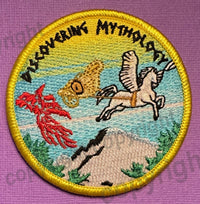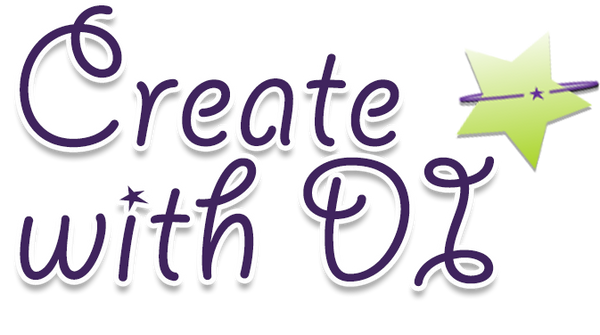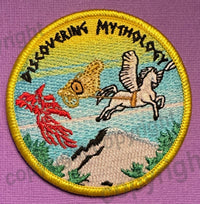Discovering Mythology
Discovering Mythology
Couldn't load pickup availability
Once you order the patch a PDF will be emailed to you to help you complete the program.
Long Ago in ancient Greece the people spoke of powerful gods, goddesses, magical creatures in mythical tales we now call mythology. The stories have been passed down from generation to generation creating fables, plays, and books with their extravagant characters. This patch program was created so you could learn more about the characters, stories, movies, and abilities.
1. The Parthenon is a temple located in Greece that was dedicated to the gods and goddesses of the mythology world. Learn more about the building like the design, age, and location.
2. Mount Olympus was considered to be the home of the great gods and goddesses called the Olympians. Research one of the Olympians. What is their name and specialty? Examples of Olympians are: Zeus, Poseidon, Hera, Hestia, Ares, Apollo, and Artemis.
3. A myth is a story with a moral or explanation of why things happen. Some myths have been around for hundreds of years and include stories about bravery, fantastic journeys, mythical beings, and humans. Choose one myth or story to read or watch.
4. Myths about people and creation of the world around us are commonly told. Stories are passed down through families. Choose a country or location to learn more about their culture and mythology. You can use our country manuals or Native American kit for an easy reference to culture or myths. Examples include: Native Americans in North America, the Celts, the Norse, Africa, Egypt, China, Japan, Greece, and Rome.
5. There are a variety of mythical creatures depicted in stories. Choose one creature to learn more about. Examples include: Phoenix, Pegasus, Gryphon and Sphinx.
6. Zeus was named the father of gods and weather. He could throw thunderbolts as a weapon. Choose a mythical god to learn more about. Examples include: Helios, Hera, Apollo, or Eros.
7. There were a variety of goddesses in mythology. Learn more about one goddess and her abilities. Examples include: Athena from Greece, Tara from Tibet, Chang O from China, Pele from Hawaii, and Brigit from the Celtics.
8. Watch a TV show, movie or play depicting a story of mythology. Examples include: Hercules®, Clash of the Titans ®, Percy Jackson and the Olympians ®, Mulan®, or The Odyssey.
9. Read a book relating to story about mythology or a character related to mythology. Examples include: Hercules®, Gods and Goddesses of the Mythology World, and The Last Olympian ®.
10. Create food or enjoy food to representing a mythology theme. Examples include: grapes, olives, hummus and chips, pita wraps, cupcakes with Greek symbols , and grape juice in goblets.
11. Play games or create activities to play representing the Greek or mythology theme. Examples include: hula hoop pass, name that mythical being, training course crawl under things, skipping through hoops on the ground, have a mini Olympic game course, Titan tag, water balloon battle, OR scavenger hunt of mythology related items.
12. Create decorations, costumes, a display or diorama with a Greek or mythology theme. Examples include: fake ivy or grape vines, cover the table or chairs with white fabric accent with gold ribbon, have a special photo area to take pictures, use acrylic paint and draw Greek symbols on the fabric, white and gold balloons, burgundy, golden yellow streamers draped from the ceiling tri-fold board of Greek gods, or diorama of the Parthenon.
13. Create a craft that represents mythology or Greek influence. Examples: decorate terracotta pots, make crowns or shields from cardboard, toga wrapping, glass votive holders, or ivy wreathes


